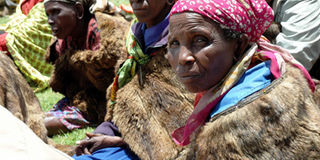Ogiek threaten to sue State for delayed justice in Mau evictions

Members of the Ogiek community during a past function. The community has threatened to go back to the African Court on Human and People's Rights in Arusha, Tanzania, over what it terms continued violation of its rights. PHOTO | FILE | NATION MEDIA GROUP
What you need to know:
- In its findings last year, the court said the Ogiek were not consulted on evictions from their ancestral lands in the Mau Forest.
- The Ogiek are one of the last remaining forest-dwelling communities in Kenya.
The Ogiek community has threatened to go back to the African Court on Human and People's Rights in Arusha, Tanzania, over what it terms continued violation of its rights.
The community, led by its council of elders chairman Joseph Towett, said the government has failed to speed up implementation of a judgment issued in May last year.
In its findings last year, the court said the Ogiek were not consulted on evictions from their ancestral lands in the Mau Forest.
After a more than five-year legal battle, the court ruled that the government had violated the community's rights and freedoms and directed the government to remedy all the violations.
TASK FORCE
The Ogiek said despite the government on November 10, 2017 gazetting a task force to implement the judgment, nothing has been done and the community continues to suffer in silence due to historical injustices.
“The best option is to go back to the Arusha-based court to seek reparations and sue the government for contempt of court. We continue to suffer even after the court directed the government to remedy all the violations established within six months,” Mr Towett told the Nation.
According to Mr Towett, for instance, the community bore the brunt of the recent skirmishes at Nessuit and Mauche in Njoro which he says were land related.
HOUSES RAZED
“More than 200 houses belonging to the Ogiek were razed in the clashes between the Ogiek and the Kipsigis communities. We also lost property worth millions of shillings in the violence. Had the government resolved these historical land matters, would we have suffered?” asked Mr Towett.
The Ogiek further said they were not consulted before the task force was formed by Environment Cabinet Secretary Keriako Tobiko and it lacks representatives from the community.
“Despite several requests to the Attorney-General to participate in a process which directly affects us, we were left out,” he said.
The task force was charged with recommending measures to provide redress to the Ogiek, which were to include restitution, compensation or the provision of alternative land. The team was also mandated to conduct studies and public awareness on indigenous peoples’ rights.
Under its mandate, the team is required to study the judgment of the African Court and any other local judgments related to the case as well as relevant laws and policies and to establish the status of the land in question.
REPARATIONS
The African Court ordered the government “to take all appropriate measures within a reasonable time frame to remedy all the violations established” and inform it of the progress within six months. The court asked the Ogiek to file their requests for reparations within two months.
The 35,000 members of the Ogiek community lived in the Mau Forest complex.
London-based lawyer Lucy Claridge litigated the case before the African Court on the community's behalf.
The Ogiek are one of the last remaining forest-dwelling communities in Kenya.
The community sued the government for eight counts of violation of their rights to life, property, natural resources, development, religion and culture under the African Charter on Human and Peoples’ Rights, to which Kenya is a signatory.
Ms Claridge, the organisation’s legal director, said the court had recognised that the Ogiek and other indigenous people in Africa had a leading role to play as guardians of local ecosystems and in conserving land and natural resources such as the Mau.
The case was initially lodged by the African Commission on Human and People’s Rights.





